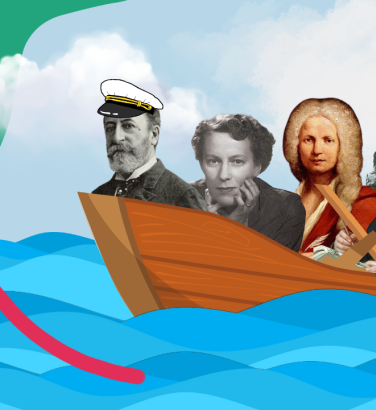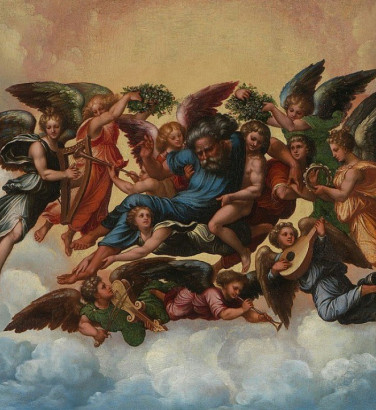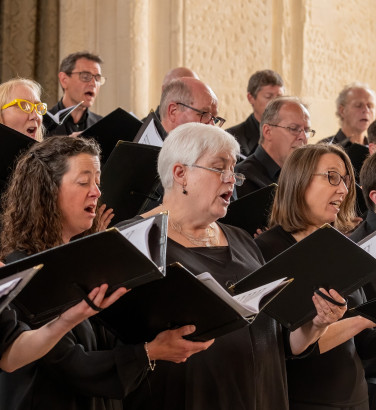
Handel (and others): music for coronations
27 Feb 2023
News Story
Detail from a painting by Henry Charles Brewer, showing George VI receiving the homage at his coronation in 1937
The coronation of our Patron, His Majesty King Charles III, is to take place on 6 May. The full details of the music to be performed at the ceremony are yet to be confirmed, but it seems a foregone conclusion that Handel’s Zadok the Priest – a constant at British coronations since its premiere at George II’s, in 1727, and part of our Handel: Music for the Royals concerts in late March – will be included.
Parry’s I was glad is also unlikely to be left off the order of service: the text (drawn from Psalm 122) has been a standard since 1633, when Charles I was crowned, and in the nearly four centuries since has been the basis for anthems by many composers, including Purcell and Boyce. Parry’s setting, premiered in 1902 (at the coronation of Edward VII), has all but left its forebears in the dust, its sheer grandeur assuring its place at countless celebratory occasions since. A firm favourite for weddings, it was sung at that of the then Prince of Wales and Diana Spencer in 1981, as well as Prince William's (now Prince of Wales) and Catherine Middleton’s in 2011.
The one piece one could reasonably expect to have a long pedigree as part of the coronation service is the National Anthem. Surprisingly, its consistent inclusion dates only from the coronation of George V, in 1911.
At the other end of the spectrum, the ceremony for Elizabeth II in 1953 saw the first performance of a serene little motet which is the very antithesis of all this pomp. A work of disarming simplicity, Vaughan Williams' O taste and see is well-known to church choirs across the UK to this day, and was among the pieces sung at the late Queen’s funeral last year.
It cannot be more properly set than it has already been by Mr. Handel
Regardless of the monarch, the music selected for their coronation has increasingly become a celebration of Britain’s choral tradition, with works by composers of yesteryear forming a significant part of the service. Historically, the Tudor period has been especially well represented (mostly by Gibbons, Tallis and Byrd), as has Purcell. Beyond this, a number of now forgotten names are listed in the records, among them many Masters of the King’s Music – few people are now familiar with Walter Parrott, for instance, who contributed music towards the coronations of Edward VII and George V – and the likes of William Knyvett, a favourite of George IV who also wrote for Queen Victoria’s coronation.
Handel, of course, is the great exception to this rule: already well-known when he was asked to compose a full set of anthems for the coronation of George II, they served as a stepping stone to his growing fame. Although the service did not run smoothly (to put it mildly), Handel's music proved an immediate success, and he capitalised on this in 1732 by recycling some of it into the expanded version of his 1718 masque Esther.
The last time any of Handel's anthems besides Zadok the Priest was performed at a British coronation was Queen Victoria's in 1838, at which The King shall rejoice was retitled The Queen shall rejoice. It is a shame Zadok should have overshadowed the others to this extent: they are as deserving of attention, and their longer duration allows for a wider variety of moods than admittedly joyous solemnity.
Either way, Handel's coronation anthems did more than maintain the standard set previously, so it is hardly surprising that few written since have been as successful. Time will tell if any of the music written for this May's coronation (lest we forget, the first in almost 70 years) will be as beloved.

Handel: Music for the Royals
Starting with their coronations, Bernard Labadie leads us through a feast of Royal celebrations, from firework displays to Queen Anne's birthday.
Related Stories
![]()
Making a splash: water music beyond Handel
6 January 2025
We take a look at musical depictions of water, from trickling burns to the wide expanse of the ocean, to see what lurks below the surface.![]()
Heavenly realms
6 May 2024
We look at some of the many depictions of Heaven in the Christian choral tradition.![]()
Israel in Egypt (according to the SCO Chorus)
14 November 2022


